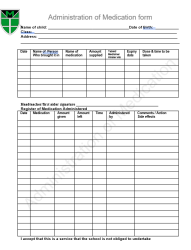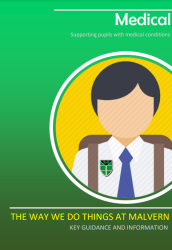Malvern Primary School will administer medication that is prescribed. School cannot administer anything that is bought over the counter.
All medication must be brought to the school office by an adult, who will be asked to complete an administration of medication form. This form will provide all the information needed by school to administer medicine safely.
- All medication (including those administered orally and applied topically) must be brought to the school by an adult. The adult will be asked to complete an administration of medicine from, this form will provide all the information needed by school to administer medicine safely. If your child has an allergy, asthma or any other additional health care need, you will be asked to come in to school and complete an individual health care plan. This health care plan allows school to support your child in managing their medical needs.
- We suggest that medicines that need to be taken three times a day are administered in the morning, after school hours and at bedtime.
We are unable accept medication that has been taken out of the container as originally dispensed. School will not make changes to the prescribed dosage on parental instruction. - If your child is on a short term course of treatment, the medication must be collected at the end of the school day by the parent/carer. If your child has a long term health care need, such as asthma or an allergy, your child’s medication must stay in school at all times.
There is no legal or contractual duty on child-care settings or school staff to administer medicine or supervise a child taking it. This is a voluntary role.
If you need a copy of the administration of medication form’ or ‘the medical policy then please click on the links below.
MEASLES
Over the summer months, Knowsley’s Public Health team are issuing advice and guidance around measles, which is extremely infectious.
Symptoms include high fever, sore, red and watery eyes, coughing, aching and feeling generally unwell and a blotchy red / brown rash.
You can help by ensuring your children receive two MMR vaccines on time (one at the age of one and the other at aged 3 years and 4 months). If your children have missed these vaccines, it’s not too late, so contact your GP to make an appointment to ensure your children are up-to-date.
Teenagers and young adults should also be fully vaccinated before traveling or attending festivals and other summer events.
If you have symptoms of measles, stay at home and phone your GP or NHS 111 for advice.
For further information, visit www.nhs.uk (search measles).




